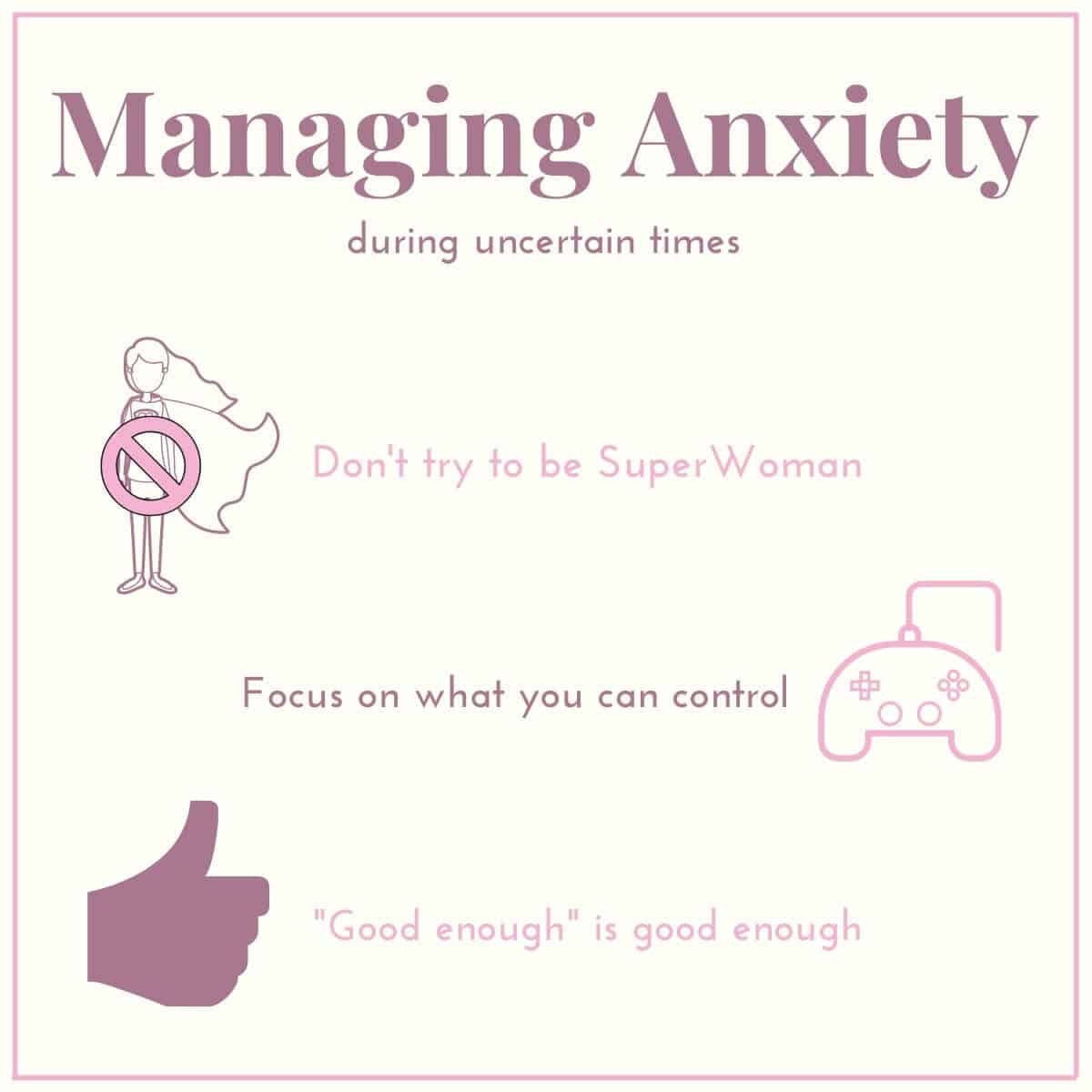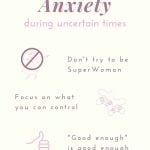Undoubtedly, we’re in hard times right now, and we’re dealing with uncertainty in a way most of us have never experienced before. Our age group didn’t live through the Great Depression or any major pandemics, and when I look around at the vast responses to our current moment, I see a lot of people feeling overwhelmed and struggling to cope.
Some people are repressing emotions, pretending the Coronavirus isn’t a big deal. Others are obsessing, hoarding, prepping for an Armageddon.
But none of those reactions to this uncertain situation serve us emotionally. In fact, they’re terrible for our mental health.
We need to find ways to be somewhere in the middle when living with uncertainty.
I’ve been called a control freak more times in my life than I can count, and I’ll be honest, it’s true. I’ve talked a lot about what it’s like living with anxiety.
But that need for control serves me well in times like these. After a decade of therapy, I’m well equipped to handle situations out of my control. Therapy has given me many tools to be comfortable with uncertainty.
We don’t know what to expect in the coming weeks and months, as schools, churches, and museums close, and grocery stores are totally out of stock. But we’ll get through it, and I hope these tips three tips will ease the process:
- This is not the time to be Superwoman
- Focus on what you CAN control
- When living with uncertainty, “good enough” is OKAY!

This site contains affiliate links, meaning that we earn a small commission for purchases made through our site. We only recommend products we personally use, love, or have thoroughly vetted.
(1) When there’s uncertainty about the future, it’s not time to be Superwoman
Seriously. Let me make one point very clear here.
While we all like a certain level of control in life, some of us like it more than others. Research shows that people with tendencies toward perfectionism are more likely to experience physical and emotional struggles when we face uncertainty.
If you’re someone who wants to know you’ve done your absolute best all the time, then chances are, you’re
- planning
- organizing
- deciding how you can accomplish your goals with as much success as possible.
But you know what? When you’re dealing with uncertainty, planning is hard. It’s almost impossible.
You can plan and prepare for certain aspects of your life, but it’s a waste of time and energy to prepare for an uncertain future.
You can’t do everything perfectly. In times of uncertainty, let go of the idea of being Superwoman (or Superman, Supermom, Superboss, Superworker, whatever your preferred super power is.)
And if you have multiple preferred super powers at once, you’ve got some serious work to do while dealing with uncertainty. Because if you can’t be super anything, you definitely can’t be super at many things.
That would lead to burnout, and quite probably, failure. Which is okay, but not an issue we want to add to our list of things to deal with right now.
Of course, for many of us, everything I’ve just said is absolutely maddening. It impacts our nervous system so we experience physical effects. It makes us dizzy, scared, clinching our jaws. That’s where the next tip comes in.
(2) Focus on what you CAN control
In order to control what you can control, you have to know what you can control.
Can you control whether you or someone you love will get sick? No.
Can you control whether you have preventative measures in place to prevent illness? Yes.
Certainly, the answer to the previous question depends on the healthcare available to you.
But if you’re worried about getting COVID-19 (also called the Coronavirus) there are things you can do.
- Wash your hands frequently
- Avoid large crowds
- Practice social distancing
- Decide what’s right for you
Once you’ve taken the time to determine what you CAN control, what there are 2 things left to do:
- Determine the most effective actions you can take, prioritize them, and do them
- Let go of everything else
What is effective action?
I take the phrase “effective action” from a psychological theory called “acceptance and commitment therapy” (ACT), which suggests that for an action to be effective, it must be linked to your values.
By values I mean this: On what ideals do you build your sense of self worth?
In other words, when I call an action effective, I mean two things:
- Will this action work toward your ultimate goal of preventing an unwanted situation?
- Is this action aligned with who you believe yourself to be, and want to be?
This last point is KEY!
If I take pride in the fact that I am non-alarmist, then dealing with the uncertainty of the Coronavirus by stockpiling groceries and locking myself in my bedroom does me no good. It will hurt my self-image, even if it helps keep me well.
But if part of my self-worth comes from knowing I’m always prepared, no matter the situation, then isolating in my home with my family could be the best move for me, even if it’s hard. In some way, it will make me feel good because I’m prepared.
That is, what is effective for one person is not the same as what is effective for another.
Note: I’m not giving you permission here to just live your life completely normally. Our government is telling us to practice distancing, so I personally believe we should. But the extent to which we take it depends on the individual.
How do I let go of ineffective fears?
Releasing ineffective fears (whatever is left after you take all the effective action possible) requires understanding how your mind works. I’m going to majorly simplify here, for the sake of easy utility.
Imagine your mind existing in 2 parts:
- Unconscious
- Conscious
The unconscious part of your mind learns from your actions and behaviors, while the conscious part of your mind learns from the information you consume.
So, if you’re terrified of COVID-19, and you’re constantly reading about it, then your conscious mind is absorbing a lot of information. It knows how many cases currently exist, what countries have major outbreaks, what protocols to follow.
Your unconscious mind, on the other hand, is learning from your behavior.
Are you stockpiling groceries? When you do, you’re telling your unconscious mind that the Coronavirus is something to be prepared for.
Are you seeking out articles and news segments to learn more? If so, you’re telling your subconscious mind that this is an issue to focus on.
The inevitable part of this cycle is that, in return, your mind will make you think about the Coronavirus more often.
Thus, the more you seek information, the more your mind will remind you to worry about this virus.
Are you saying I should stop learning about COVID-19?
Absolutely not! Being informed is essential.
What I am saying, though, is that you need to be CAREFUL with the information you consume.
Are your social media feeds filled with information about the Coronavirus? If so, consider a social media break.
Are you actively searching for new information or news each day? If so, allow yourself to read major headlines or articles that are written by extremely reputable sources. Skip the rest.
You need information to be informed, but once you feel informed, continually seeking information actually trains your brain to place even more emphasis on the uncertainty at hand.
And that doesn’t serve you.
What it does is cause excessive worry, anxiety, and sleeplessness (and did you know sleep is one of the best things you can do for your immune system)?
So learn what you need to learn to be EFFECTIVE, as defined above. Then let the rest go .
How do I let the rest go?
This is the hard part, and my methods may sound weird, but trust me, they work. There are two of them, and you’ll be more effective if you do both.
(1) Talk to yourself
It can be out loud, in your mind, or on paper in writing. But talk to yourself, lovingly and gently, and leave out rationality (because the subconscious mind, which is causing your anxiety, does not understand rationality.)
Here’s an example of how I talk to mind.
Dearest mind. Thank you for trying to protect me. I truly appreciate it. I know you’re just trying to take care of me by reminding me to worry about X. But I’ve taken all the effective I action I can for now to solve the problem of X, so worrying further does not serve me. I’m going to release that thought now. I know you’ll bring it back to me later, and that’s okay. But for now, I’m going to let it go.
It sounds nuts, but I promise, the more regularly you have this conversation with your mind when you have unhelpful thoughts, the less frequent those thoughts will become.
(2) Control your actions
This is the hardest part, but it’s also essential. If you’re practicing good hygiene and social distancing, then there isn’t much else you can do to prevent the Coronavirus.
You can’t control whether the government is responding in a way you agree with or whether your neighbors are behaving how you think they should. And remember, this is about controlling what you can control.
What you can control is your actions!
So if you’re taking all the effective actions you can, then scrolling through social media and reading every article is NOT effective.
You’ve taken your effective actions. Force yourself to stop the ineffective ones.
It’s hard, and you might have to develop a system where you work your way down. (i.e. I’ll only read 2 articles for the next 3 days, then I’ll go down to 1.)
But if you take the action and stay consistent, your subconscious mind will learn from that behavior, and lessened anxiety will follow, in time.
Keep in mind that there is no immediate fix to feeling like you need to control everything.
(3) When living with uncertainty, “good enough” is okay
It may sound obvious, or silly, or perhaps counter to everything you’ve been told. But sometimes, being “good enough” really is good enough.
There’s a lot going on as you’re living with uncertainty, and now is not the time to try to do everything really well.
Remember I said not to be Superwoman? I mean it! That’s why I’m repeating this point with completely different phrasing.
Maybe your kids are home from school indefinitely.
Maybe you’re out of a paycheck for at least a few weeks.
Maybe you’re going to have to juggle full-time parenting and full-time working from home when you’re not used to that.
Maybe you’re immunocompromised, your kid is in chemotherapy, or your parents are elderly.
Everything is uncertain and you’re frustrated and you’re scared.
I get it. And here’s what I need you to know.
SUPERWOMAN HAS LEFT THE BUILDING!

Now is a time to let the idea of SuperWoman go. You don’t need her. You need YOU!
Give yourself grace.
Let your kids overindulge in screen time.
Be “good enough.”
Because sometimes, not only is “good enough” actually good enough, it’s BEST.
And now is one of those times. Love yourself. Love your family. Take care of those around you. Take care of YOU!
It’s okay to be frustrated, scared, angry, confused, overwhelmed.
And more than anything, IT’S OKAY TO BE GOOD ENOUGH!
What’s one thing you do to control what you can control when dealing with uncertainty?
Additional Resources
There are so many things you can do while stuck at home to feel better about yourself and your life.
Meg from Nourished Strong is a registered dietician who uses cognitive behavioral therapy approaches to help improve her clients’ feelings about their eating habits and their bodies. Check out her four ideas for self care during stressful seasons.
Karen from Well Balanced Women, a personal trainer and friend, has you covered with exercises you can do at home, even when the kids are there!
Wondering what the heck to do while stuck at home with kids?
- Our favorite outdoor and indoor activities for kids at home (toddler & preschool)
- Check out these stay at home kid activities for elementary-aged kids
Other articles for dealing with life during Coronavirus
- Giving birth during Coronavirus
- Dealing with uncertainty + managing anxiety










